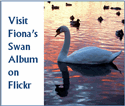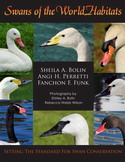Ask the Swan Specialist
Date: 4 December 2009
Hi Denise:
Black swans mate and produce cygnets twice a year. Other swan species usually produce one clutch a year.
Yes, the cold temperatures can get to the cygnets as well as the adults as the Black Swans are a southern hemisphere bird from Australia. Even though the mother's body heat may help somewhat, she is going to get cold and the cygnets do not have sufficient feathers to get through the bitter cold. We would strongly suggest placing both the cygnets and the adults in your barn for the winter.
In doing so, you will need to provide a secure location so that predators cannot enter your barn, i.e., raccoons, coyote, foxes, etc. from either digging under the barn or climbing into the barn. Predators are a primary source of injury and death especially during the winter months as they can access frozen areas of ponds to get to birds in the middle of the pond and food sources are scarce during this time of the year. Captive swans are easy prey, especially cygnets.
You will need to provide an area so that you can place a small flat pool of some kind in the barn so that the birds can bathe and drink. A kiddie pool may be too high for the young cygnets to access and may hurt their legs. So, you will need to supervise the swimming/bathing time for about an hour day if you use the kiddie pool to help the cygnets get in and out of the water without hurting themselves. Cygnets will only bathe for about 30-60 minutes and after this can drown if they are not dried due to lack of feathers. So, once a day bathing period will be sufficient to allow the birds to clean themselves and it needs to be done during the warmest part of the day. You will also need an area to drain and refill the pool on a daily basis.
If you do not want to provide a pool, then you can buy a spray dispenser and fill it with water. Occassionally, during the warmest time of the day, you can gently spray the birds down (do not soak), but just give them enough water on their feathers so that they can preen and clean themselves.
Even if a pool is not provided, you will still need a flat pan for drinking and providing ample water so that the birds can eat. Swans like their cracked corn and layer pellets placed in the water along with lettuce and bread. They need mushy food so that they do not choke on the food. By keeping the food in the water, you will also prevent predators such as ants and rats.
Swans in captive settings especially during inclement weather are a labor intensive challenge. But, for the birds' survival, sacrifices by swan keepers and veterinarians must be made for their humane care. We hope that this information is of benefit. The Regal Swan
Messages In This Thread
- Winter care for new baby swans -- denise -- 4 December 2009
- Re: Winter care for new baby swans -- The Regal Swan -- 4 December 2009
- Re: Winter care for new baby swans -- Denise -- 7 December 2009
- Re: Winter care for new baby swans -- The Regal Swan -- 7 December 2009
- Re: Winter care for new baby swans -- Denise -- 7 December 2009
- Re: Winter care for new baby swans -- The Regal Swan -- 4 December 2009
Ask the Swan Specialist is powered by
Tetra-WebBBS 5.30 Beta © 2006-2007 Tetra-Team






